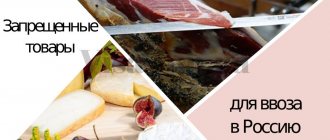The Russian government has expanded economic sanctions against Ukraine, adding to the list of goods prohibited for import, including some food products. Their full list is disclosed in the relevant resolution posted on the official Internet portal of legal information.
Thus, the Russian government has added to the list of products that are prohibited from being imported from Ukraine by decree of December 29, 2021. This decision was made in accordance with the presidential decree of October 22, 2021 “On the application of special economic measures in connection with unfriendly measures of Ukraine against citizens and legal entities of the Russian Federation.”
What's on the list
The new decree, which comes into force on the day of official publication, includes some food products on the list of prohibited imports from Ukraine into Russia, including meat products, crustaceans, shellfish, sugar, pasta, barley, tomato ketchup, mayonnaise, soups and broths, ingredients for making sauces, mixed seasonings and flavorings, cocoa paste.
In addition, a ban is being introduced on the import into Russia of ice cream and some types of edible ice, mineral water, as well as soda containing sweeteners and flavoring substances, palm oil, muesli based on fried cereal flakes, products for feeding livestock, cake, enzymes and enzyme preparations.
The list also includes non-food products. Now it will not be possible to import timber six centimeters thick, crates and cartons, packaging crates, drums and similar wood containers, pallets and other loading shields and wooden shells into Russia from Ukraine.
Which products are for personal use?
Not all goods can be considered goods for personal use. Thus, Appendix 6 to the Decision of the EEC Council of December 20, 2017 No. 107 contains a list of goods that under no circumstances can be classified as goods for personal use. Examples of such products:
- fish, crustaceans and sturgeon caviar (starting from a certain amount);
- alcohol, tobacco and tobacco products (starting from a certain amount);
- many types of vehicles (for example, heavy trucks, buses, tractors, etc.);
- medical technology and equipment, with the exception of simple household appliances and fixtures.
What is Ukraine doing
At the end of March, Kyiv once again tightened sanctions against Russia, banning the import of wheat, rye and sunflower oil from the country. Also, the list of goods prohibited for import to Ukraine has been supplemented with newspaper and toilet paper, kraft paper, cosmetic wipes, hand towels, tablecloths, detergents, boxes, boxes, bags, packages, drilling tools, wheels and their parts, and others.
At the same time, from February 1, Ukraine, against the backdrop of a coal shortage, resumed purchasing electricity from Russia. Then acting Energy Minister Yuri Vitrenko called the deal inevitable, since the republic is still in the common energy system with Russia and Belarus. According to him, to avoid procurement, Ukraine must connect to Europe. Before this, Deputy Energy Minister Vitaly Shubin indicated that the process would take about three years.
03 Fish and crustaceans, molluscs and other aquatic invertebrates 0301 Live fish: - ornamental fish: - other live fish: 0302 Fish, fresh or chilled, excluding fish fillets and other fish meat of heading 0304: - salmon, excluding liver, caviar and milk: - flounder fish (Pleuronectidae, Bothidae, Cynoglossidae, Soleidae, Scochthalmidae and Citharidae), excluding liver, caviar and milk: - tuna (genus Thunnus), skipjack, or skipjack tuna (Euthynnus (Katsuwonus) relamis), excluding liver, caviar and milk: - herring (Clupea harengus, Clupea pallasii), anchovies (Engraulis spp.), sardines (Sardina pilchardus, Sardinops spp.), sardinella (Sardinella spp.), sprat or sprat (Sprattus sprattus), mackerel (Scomber scombrus) , Scomber australasicus, Scomber japonicus), mackerel (Trachurus spp.), cobia (Rachycentron canadum) and swordfish (Xiphias gladius), with the exception of liver, caviar and milk: - fish of the families Bregmacerotidae, Euclichthyidae, Gadidae, Macrouridae, Melanonidae, Merlucciidae, Moridae and Muraenolepididae, excluding liver, caviar and milk: - tilapia (Oreochromis spp.), catfish (Pangasius spp., Silurus spp., Clarias spp., Ictalurus spp.), carp (Cyprinus carpio, Carassius carassius, Ctenopharyngodon idellus, Hypophthalmichthys spp., Cirrhinus spp., Mylopharyngodon piceus), eel (Anguilla spp.), Lates niloticus and snakeheads (Channa spp.), excluding liver, caviar and milk: - other fish, excluding liver , caviar and milt: 0302900000 - liver, caviar and milt 0303 Frozen fish, excluding fish fillets and other fish meat of heading 0304: - salmon, excluding liver, caviar and milt: - tilapia (Oreochromis spp.), catfish (Pangasius spp., Silurus spp., Clarias spp., Ictalurus spp.), carp (Cyprinus carpio, Carassius carassius, Ctenopharyngodon idellus, Hypophthalmichthys spp., Cirrhinus spp., Mylopharyngodon piceus), eel (Anguilla spp.), Lates Nile (Lates niloticus) and snakeheads (Channa spp.), excluding liver, caviar and milt: - flounders (Pleuronectidae, Bothidae, Cynoglossidae, Soleidae, Scohrthalmidae and Citharidae), excluding liver, caviar and milt: - tuna (genus Thunnus), skipjack , or skipjack tuna (Euthynnus (Katsuwonus) pelamis), with the exception of liver, caviar and milk: - herring (Clupea harengus, Clupea pallasii), sardines (Sardina pilchardus, Sardinops spp.), sardinella (Sardinella spp.), sprat or sprats (Sprattus sprattus), mackerel (Scomber scombrus, Scomber australasicus, Scomber japonicus), mackerel (Trachurus spp.), cobia (Rachycentron canadum) and swordfish (Xiphias gladius), excluding liver, caviar and milk: - fish of the families Bregmacerotidae , Euclichthyidae, Gadidae, Macrouridae, Melanonidae, Merlucciidae, Moridae and Muraenolepididae, excluding liver, caviar and milt: - other fish, excluding liver, caviar and milt: 030390 - liver, caviar and milt: 0304 Fish fillet and other fish meat (including minced meat), fresh, chilled or frozen: - fresh or chilled fillets of tilapia (Oreochromis spp.), catfish (Pangasius spp., Silurus spp., Clarias spp., Ictalurus spp.), carp (Cyprinus carpio, Carassius carassius, Ctenopharyngodon idellus, Hypophthalmichthys spp., Cirrhinus spp., Mylopharyngodon piceus), eel (Anguilla spp.), Lates niloticus and snakehead (Channa spp.): - other fish fillets, fresh or chilled: - other, fresh or chilled: - frozen fillet of tilapia (Oreochromis spp.), catfish (Pangasius spp., Silurus spp., Clarias spp., Ictalurus spp.), carp (Cyprinus carpio, Carassius carassius, Ctenopharyngodon idellus, Hypophthalmichthys spp., Cirrhinus spp., Mylopharyngodon piceus), eel (Anguilla spp.), Nile lates (Lates niloticus) and snakehead (Channa spp.): - frozen fillets of fish of the families Bregmacerotidae, Euclichthyidae, Gadidae, Macrouridae, Melanonidae, Merlucciidae, Moridae and Muraenolepididae: - fillets of other fish , ice cream: - other, ice cream: 0305 Fish, dried, salted or in brine; smoked fish, not subjected to heat treatment before or during smoking; fine and coarse fish meal and fish pellets, suitable for human consumption: 0305100000 - fine and coarse fish meal and fish pellets, suitable for human consumption 0305200000 - fish liver, caviar and milt, dried, smoked, salted or in brine - fish fillet, dried, salted or in brine, but not smoked: - smoked fish, including fillets, except edible fish by-products: - dried fish, except edible fish by-products, salted or unsalted, but not smoked: - salted fish, but not dried or smoked, and fish in brine, except edible fish by-products: - fins, heads, tails, swim bladders and other edible fish by-products: 0306 Crustaceans, whether in shell or not, live, fresh, chilled, frozen, dried , salted or in brine; crustaceans, smoked, whether in shell or not, whether or not cooked before or during smoking; crustaceans in shell, boiled by steaming or in boiling water, chilled or not, frozen, dried, salted or in brine; flours and crustacean pellets, fit for human consumption: - frozen: - not frozen: 0307 Shellfish, whether in shell or not, live, fresh, chilled, frozen, dried, salted or in brine; shellfish, smoked, in shell or without shell, whether or not cooked before or during smoking; fine and coarse flour and granules of shellfish, suitable for human consumption: - oysters: - scallops, including king scallops, of the genera Pecten, Chlamys or Placorecten: - mussels (Mytilus spp., Perna spp.): - cuttlefish (Seria officinalis , Rossia macrosoma, Serioteuthis spp.) and squids (Ommastreрhes spp., Loligo spp., Nototodarus spp., Serioteuthis spp.): - octopuses (Octorus spp.): 030760 - snails, except liparis: - clams, cordates and arches ( families Arcidae, Arcticidae, Cardiidae, Donacidae, Hiatellidae, Mactridae, Mesodesmatidae, Myidae, Semelidae, Solecurtidae, Solenidae, Tridacnidae and Veneridae): - abalone (Haliotis spp.): - other, including fine and coarse flour and granules, suitable for human consumption: 0308 Aquatic invertebrates, other than crustaceans and molluscs, live, fresh, chilled, frozen, dried, salted or in brine; aquatic invertebrates, other than crustaceans and molluscs, smoked, whether or not cooked before or during smoking; fine and coarse flour and granules from aquatic invertebrates, except crustaceans and mollusks, suitable for human consumption: - sea cucumbers (Stichopus japonicus, Holothurioidea): - sea urchins (Strongylocentrotus spp., Paracentrotus lividus, Loxechinus albus, Echichinus esculentus): 030830 - jellyfish (Rhopilema spp.): 030890 - other:
List of documents for the export of goods from the Russian Federation and import into a foreign country
Having determined the direction and course of export of their products, each manufacturer will be faced with the process of obtaining permits necessary to pass through the customs territory of the Eurasian Economic Union.
So, to successfully organize the process of customs clearance of goods, the exporter will need the following documents:
- Certificate of origin of goods. This document is submitted to the customs authority to calculate the cost of customs duty. The certificate can be obtained by contacting the territorial chambers.
- Certificates of conformity are documents confirming compliance with prohibitions and export restrictions. For certain categories of goods, phytosanitary, environmental and other certificates will be required.
- If the list of exported products contains dual-use goods, then additional certificates will be required for their registration:
- License of the Federal Service for Technical and Export Control of the Russian Federation (FSTEC RF), confirming the absence of intention to use the product for terrorist or other purposes contrary to the law.
More detailed information can be obtained on the website www.fstec.ru.
- Additional phytosanitary certificates. If the exported product is a product of plant origin, then confirmation of its compliance with hygiene standards and quarantine control is necessary. These certificates can be issued at territorial authorities or Rosselkhoznadzor. Further, phytosanitary confirmations must be attached to the transport documents.
- Special permits for export. Some types of goods require additional customs certificates. For example, metal products require a radiation certificate, works of art require confirmation that they are not objects of cultural heritage. These certificates can be obtained from the territorial department of the Ministry of Culture of the Russian Federation.
Attention! The certificate is valid for two weeks from the date of issue.
In addition, the exporter will need to formalize:
- An international transport bill of lading (CMR), which will contain a description of the goods being exported and confirm the movement of goods across the territories of states. The CMR also contains information about the vehicle transporting the goods, the loading address and the unloading location.
- Shipping documents: waybill, shipping specification.
In accordance with paragraph 3 of Protocol No. 18 to the Treaty on the “Eurasian Economic Union” of May 29, 2014, goods from Russia to the EAEU countries are subject to a zero tax rate, which must be justified before the tax authorities. To substantiate it, the exporter will need the following documents:
- Tax return;
- Contracts concluded with a taxpayer of another EAEU member state;
- Bank statement confirming receipt of proceeds from the sale of exported goods to the account of the Russian taxpayer;
- Application for import of goods and payment of indirect taxes indicating all information;
- Shipping invoices confirming the movement of goods across the territories of states.
- Other documents that can confirm the validity of applying a zero VAT rate.
After all the above procedures, you can be sure that the likelihood of successfully passing customs inspection and receiving your benefit will increase significantly. Please note that for advice on how to successfully ship goods, you can contact the specialists of the Ural Foreign Trade Company who will be happy to help you!
Author - Alina Vladimirova Customer Service Specialist
Order of the Ministry of Finance 126n - changes from October 1, 2021! Priority for goods of Russian origin
The Ministry of Finance made changes to order 126n.
Now the order has two applications. From the old Appendix, which is now number 1, 10 positions were excluded, several more were replaced, and more than 30 new ones were added. The new Appendix No. 2 includes more than 40 OKPD 2 codes.
For products from Appendix 1, the preference on the contract price remains 15% .
For goods from the Second Appendix that are purchased as part of national projects, the price advantage will be 20%.
For bidding in the form of a competition, request for quotations, request for proposals: if the product is Russian-made, then when evaluating submitted applications, the price indicated by the participant will be considered as if it were 15% (20%) lower (for example, the participant indicated the price in the application 100 000 rubles, during consideration and evaluation will be taken into account as if he submitted a price of 85,000 rubles (80,000 rubles).In this case, the contract will be concluded with the winner at the price specified by him in the application (in our example, this is 100,000 rubles).
For procurement in the form of an auction: applications are considered at the price that participants indicated in their application. BUT! If a participant who offers at least 1 foreign product wins, then the contract with him is concluded at 15% (20%) lower than the price he offered (for example, such a participant offered a contract price of 100,000 rubles and won the auction, but if he offers a foreign product for delivery goods, then the contract with it is concluded for 85,000 (80,000) rubles).
When participating in an auction, it is necessary to declare the country of origin of the goods in parts 1 and 2 of the application!
Priority for goods of Russian origin does not apply if:
- the purchase did not take place
- All participants have the country of origin of the goods in Russia
- all participants have foreign goods
Government Decree No. 925
Competition or any other procedure with evaluation criteria : if the product is Russian-made, then when evaluating submitted applications, the price indicated by the participant will be considered as if it were 15% lower. And the contract is concluded at the price proposed in the participant’s application (similar to Order of the Ministry of Finance 126n).
A competition or any other procedure with evaluation criteria for the supply of radio-electronic products: if the product is Russian-made, then when evaluating submitted applications, the price specified by the participant will be considered as if it were 30% lower. The contract is concluded at the price proposed in the participant’s application.
An auction or any other procedure where a step-by-step price reduction takes place: if the supplier offers a product of non-Russian origin, then the contract is concluded at 15% less than the proposed price in the application.
If during the auction the price drops to 0, then participants begin to offer their price for the right to conclude a contract. Those. suppliers name the price they are willing to pay the customer. The winner offering a foreign product enters into a contract for 15% more than the amount he offered.
An auction or any other procedure where there is a step-by-step reduction in the price for the supply of radio-electronic products: if the product is made in Russia, then when considering submitted applications, the price indicated by the participant will be assessed as if it were 30% lower.
If during the auction the price drops to 0, then participants begin to offer their price for the right to conclude a contract. Those. suppliers name the price they are willing to pay the customer. The winner offering a foreign product enters into a contract for 30% more than the amount he offered.
According to PP No. 925, in order to obtain priority, it is necessary to confirm the country of origin of the goods by declaring in the application. If this does not happen, the goods will be assessed as foreign. To confirm services, you must provide a document indicating the place of registration of the participant.
Resolution No. 925 on restricting and prohibiting the admission of foreign goods does not give priority to Russian goods if:
- the purchase did not take place;
- all participants have Russian-made goods/services;
- all participants have foreign goods or foreign registration;
- in the application for the competition the value of goods from Russia is less than 50%;
- In the auction application, the value of goods from Russia is more than 50%.
Government Decree No. 102
This Resolution requires participants to provide a CT-1 certificate, as well as a declaration of the country of origin in parts 1 and 2 of the application.
If at least 2 suppliers with Russian goods from different manufacturers take part in such a purchase, then Order 126n applies to the purchase.
If a participant does not provide ST-1, then his goods are automatically considered as foreign.
This resolution on the ban and restriction of foreign goods does not apply if the purchase takes place within the framework of state programs (they are listed in the resolution itself).










